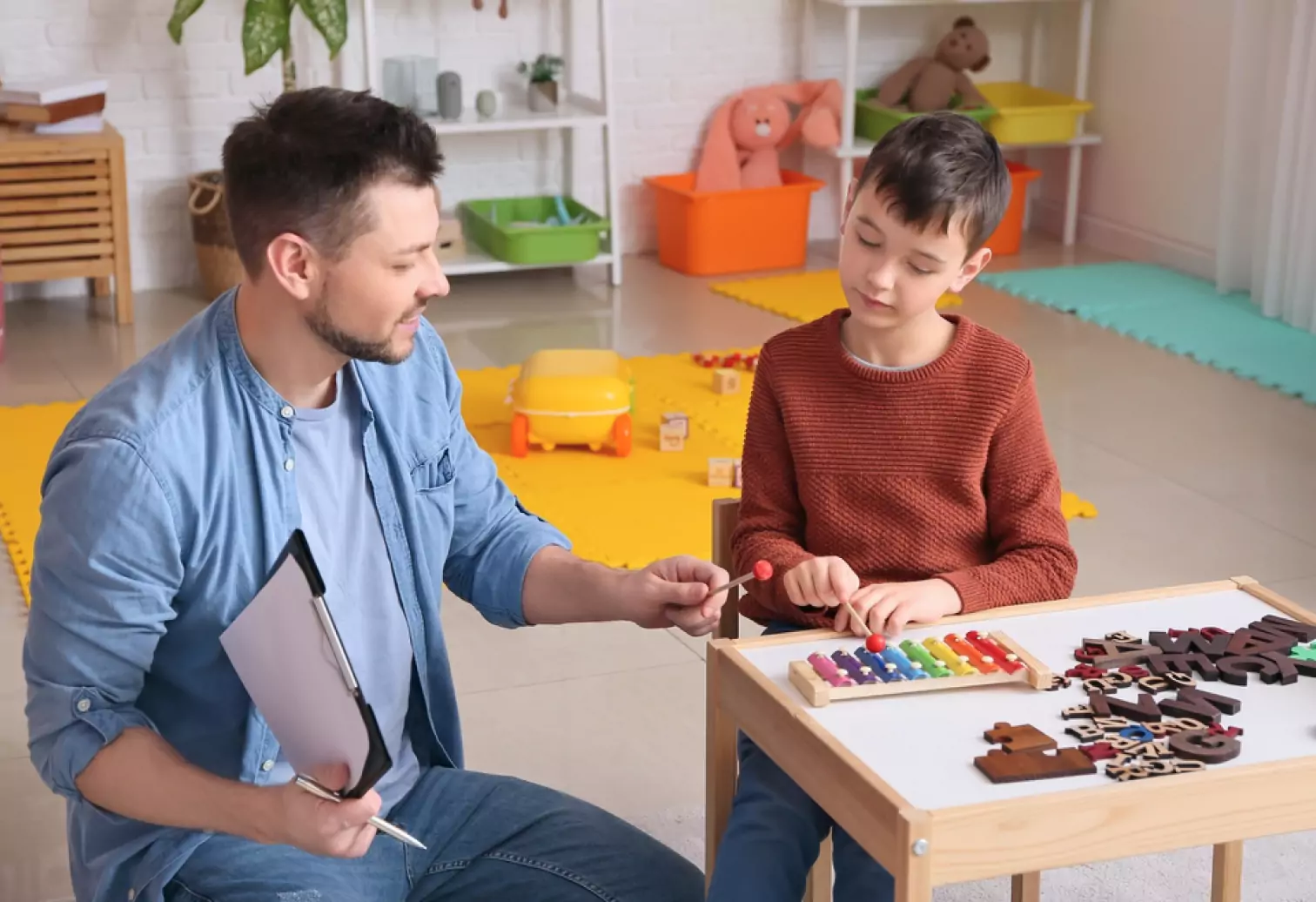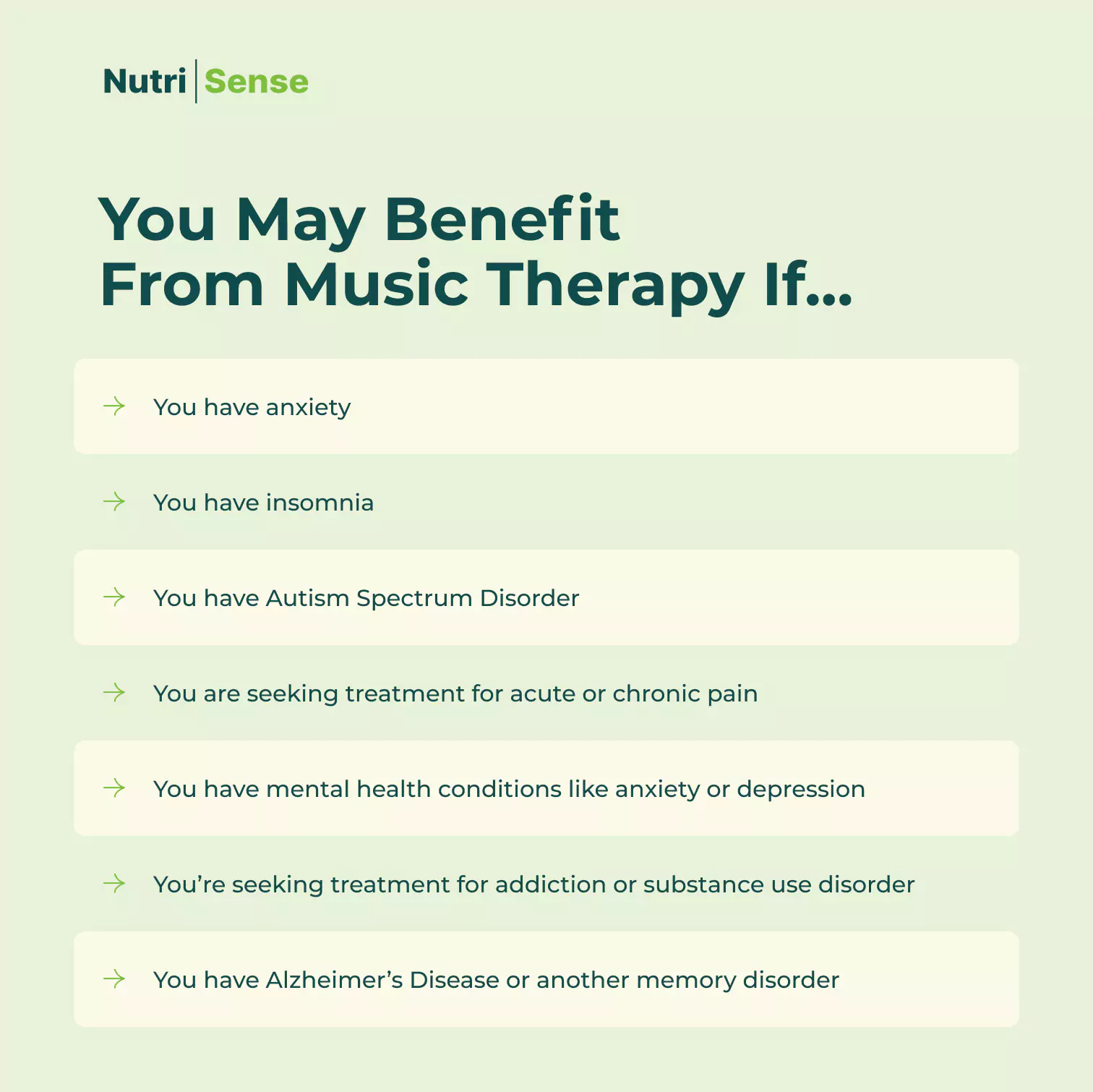Can Music Therapy Help You Optimize Your Health?

Key Takeaways
What connects author Jodi Picoult, actor J.K. Simmons and musicians Ben Folds and Mickey Hart? They’re all supporters of or associated with music therapy! So, can this celeb-approved form of therapy really help, or is it just a fad? And what even is music therapy?
Music therapy services are gaining popularity, and research suggests they can improve overall wellness for anyone who wants to optimize their health. They’re also a common form of therapy in nursing homes. They are used to improve the quality of life for patients with certain health conditions.
Take a look at what music therapy is and how it may be able to benefit you.
What is Music Therapy?

Music therapy is a therapeutic practice where a board-certified music therapist uses music to address various physical and mental health conditions. For example, studies have shown that music can slow the production of the stress hormone cortisol. It also may help increase the production of antibodies and killer cells that protect the human body from viruses and infection and boost the immune system.
Using music as therapy has been around for centuries but only emerged as a profession in the 20th century. And no, it doesn’t require you to have any musical skills!
According to the American Music Therapy Association, VA hospitals hired musicians to assist in treating injured veterans during World War II. In the 1940s, music therapy was introduced to the official curricula of colleges across the United States.
Currently, there are more than 9,000 board-certified music therapists. When it comes to music therapy, no specific type of music is seen as more beneficial than another. You can use all kinds of music according to your preferences and therapeutic goals.
A Certified Form of Therapy

People who participate in music therapy engage with music in several different ways to address mental and physical health conditions. This type of therapy can include songwriting and performing music, musical improvisation, singing, receptive listening to music, musical and lyrical discussion, and music and imagery.
A board-certified music therapist conducts the therapy in individual or group settings. Music therapy is used for numerous conditions, including Alzheimer’s disease, soothing and lowering the heart rate of preterm infants, and treating depression and anxiety, among many others.
Several organizations have music therapy programs and certified therapists you can visit for sessions. One of the largest professional associations of music therapists is The American Music Therapy Association. It was founded in 1998, with over 5,000 members worldwide. They have several musical therapists and pioneer research on the effectiveness of music as a therapeutic tool and encourage an evidence-informed practice of music therapy.
Wondering what ‘certified’ means when it comes to music therapy? A certified music therapist holds a bachelor’s degree or higher from an American Music Therapy Association-approved college or university. Aside from coursework, the music therapy degree requires 1200 hours of clinical training.
Upon completion of their degree, music therapists must pass the MT-BC exam, which stands for Music Therapist-Board Certified. After passing the test, a certification is valid for five years. To be re-certified after five years, therapists must submit 100 credits of continuing education in music therapy.
How is Music Therapy Conducted?

Because music therapy can address such a wide variety of conditions, there is no one-size-fits-all music therapy session. Sessions are conducted by board-certified music therapists and can include listening to music, talking about and analyzing music, and playing or writing music.
A patient works with the therapist to establish goals, then the therapist assesses the patients’ needs and determines their approach. There are numerous music therapy methods and how a session is conducted depends on the method.
Individual or group sessions with a music therapist can occur in clinics, hospitals, drug and alcohol detoxification centers, senior living facilities like nursing homes, physical rehabilitation centers, private offices, and correctional facilities.
The Types of Musical Therapy

Music therapy may not be part of the traditional healthcare landscape (yet), but several types and forms are already in practice. There are several approaches to practicing music therapy, including:
- Aesthetic Music Therapy: This method is a music-centered approach. It focuses on an understanding of musical structures and composition and emphasizes an engagement with the process of creating music..
- Anthroposophical Music Therapy: This model focuses on the therapeutic benefits of specific musical scales, tones, and musical instruments, like the lyre.
- Bonney Method of Guided Imagery and Music: This method involves listening to a piece of music chosen by a therapist and processing the memories, emotions, and images that arose while listening to the music.
- Cognitive-Behavioral Music Therapy: In this method, which adopts the principles of cognitive-behavioral therapy, music is used to identify and modify behavioral patterns.
- Community Music Therapy: This method emphasizes musical participation between group members and therapists in an inclusive, collaborative, and communal environment.
- Developmental Music Therapy: Designed for individuals with developmental disabilities, this method uses music to help develop your sense of self, others, and the environment.
- Neurological Music Therapy: This approach is concerned with the effect of music on non-musical parts of the brain and music’s ability to train or re-train brain and behavior functions.
- Nordoff-Robbins Music Therapy: In this method, you have an active role in creating music itself. The idea here is that making music enables emotional and cognitive development and self-expression.
- Psychodynamic Music Therapy: Psychodynamic music therapy is founded on the principles of psychoanalysis. It focuses on music’s ability to make you aware of your emotional state and communicate it through musical performance.
- Vocal Psychotherapy: This method centers around using singing as a therapeutic process. It also incorporates the therapeutic benefits of deep breathing and provides an outlet for emotions through vocal expression.
Some Potential Benefits of Music Therapy

Music therapy can be helpful for a wide range of mental and physical health conditions. It can be beneficial to people of all ages with all levels of musical experience.
Music therapy is not intended to take the place of other medical and mental health treatments but is most effective when used in conjunction with appropriate treatments for your condition. It’s a good idea to speak with a doctor or therapist so you can decide whether music therapy will be an effective treatment for you.
Music Therapy and Addiction Treatment

Music therapy is often part of the treatment for substance use disorders and addiction recovery. In this context, music therapy can assist in establishing motivation for sobriety and a connection to the self while facilitating the processing of past experiences and enabling mood regulation.
Studies have also shown that making and listening to music can activate similar pathways as many commonly abused substances. While these results are promising, research on the effect of music therapy on addiction treatment is still ongoing.
Music Therapy and Anxiety

There is a lot of research that suggests that music therapy can be beneficial for treating anxiety. Studies have shown that music therapy can reduce the stress hormone cortisol and regulate mood, particularly when combined with other treatments.
It may also effectively lower anxiety in cancer patients undergoing radiation treatment.
Music Therapy and Autism

Several studies suggest music therapy is beneficial to individuals with autism. According to research, music therapy can help improve social interaction. It can also improve verbal and non-verbal communication skills, initiating behavior, and social adaptation skills in people with Autism Spectrum Disorder.
Music Therapy and Blood Glucose

Research suggests that music can affect cortisol levels in the blood, affecting blood glucose. A study on elderly diabetes patients found that music therapy resulted in increased adherence to exercise regimens and improved blood circulation in their lower extremities when combined with exercises meant to control blood glucose levels.
Music Therapy and Chronic Pain

When combined with other medical interventions, music therapy can be an effective treatment for relieving both acute and chronic pain. Studies have shown a significant decrease in self-reported pain in palliative care patients, in children undergoing medical procedures, and in patients undergoing treatment for burns.
Music Therapy and Memory Disorders

Several studies have shown that music therapy can significantly improve memory, orientation, anxiety, agitation, and language disorders in individuals with Alzheimer’s disease. Other research confirm its potential for reducing cognitive decline, executive function, and motor skills in Alzheimer’s patients.
According to the American Music Therapy Association, musical memory can be accessed in several different parts of the brain, making it accessible even in the late stages of memory disorders. While music therapy won’t reverse cognitive function loss, it can improve what function is still there.
Music Therapy and Mental Health

Studies show that when combined with other interventions, music therapy can alleviate symptoms of depression, improve mental health conditions like depression, and decrease anxiety levels.
Music therapy, particularly group music therapy, can help build meaningful relationships and help with specific social needs. For example, it can decrease the feeling of social isolation that can be associated with mental illnesses like depression and anxiety.
Music Therapy and Physical Rehabilitation

Studies have found that music therapy can enhance physical, psychological, cognitive, and emotional function during physical rehabilitation. Music therapy was also shown to increase motivation during physical rehabilitation sessions.
Music Therapy and Sleep Disorders

Some research suggests that music therapy interventions can help people with sleep disorders. Music may improve sleep quality in patients with acute and chronic sleep disorders and increase comfort and self-esteem. It can also decrease anxiety, which has adverse effects on sleep quality.
How to Get Started With Music Therapy

Talk to your doctor or therapist to find out if music therapy is an effective treatment for you. If you want to explore the potential therapeutic effects of music on your own time, a fun way to start could be by exploring the wide variety of music therapy and soundscape applications available for your smartphone.
However, because music therapy is a clinical practice, it is most effective when practiced with a board-certified music therapist. Forming a therapeutic relationship with someone who knows the ins and outs of how this form of therapy works can be beneficial. The American Music Therapy Association database can help connect you with licensed music therapists in your area.

Find the right Nutrisense programto turn insight into progress.
Go Beyond Glucose Data with Nutrisense
Your glucose can significantly impact how your body feels and functions. That’s why stable levels are an important factor in supporting overall wellbeing. But viewing glucose isn't enough. Nutrisense, you’ll be able to learn how to use your body's data to make informed lifestyle choices that support healthy living.
One-to-one coaching
Sign up to access insurance-covered video calls to work with a glucose expert: a personal registered dietitian or certified nutritionist who will help tailor your lifestyle and diet to your goals.
Monitor and measure what matters
With the Nutrisense CGM Program, you can monitor your glucose with health tech like glucose biosensors and continuous glucose monitor (CGM)s, and analyze the trends over time with the Nutrisense App. This will help you make the most informed choices about the foods you consume and their impact on your health.
Find your best fit
Ready to take the first step? Start with our quiz to find the right Nutrisense program to help you take control.

Heather is a Registered and Licensed Dietitian Nutritionist (RDN, LDN), subject matter expert, and technical writer, with a master's degree in nutrition science from Bastyr University. She has a specialty in neuroendocrinology and has been working in the field of nutrition—including nutrition research, education, medical writing, and clinical integrative and functional nutrition—for over 15 years.




